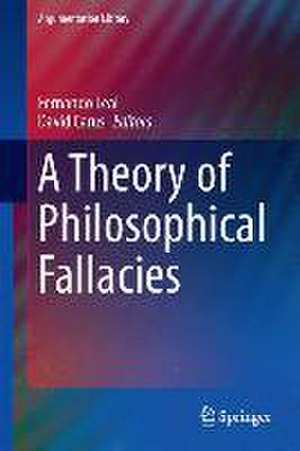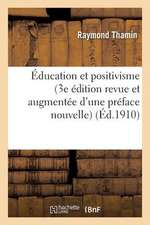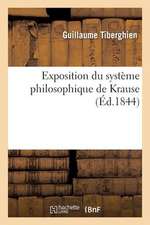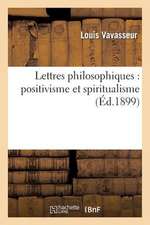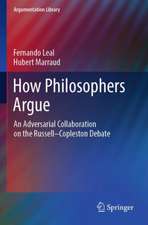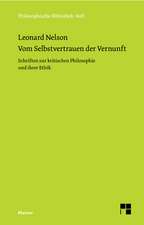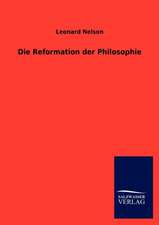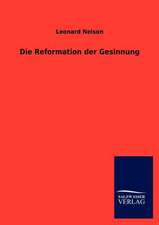A Theory of Philosophical Fallacies: Argumentation Library, cartea 26
Autor Leonard Nelson Traducere de Fernando Leal, David Carusen Limba Engleză Hardback – 19 aug 2015
| Toate formatele și edițiile | Preț | Express |
|---|---|---|
| Paperback (1) | 383.71 lei 6-8 săpt. | |
| Springer International Publishing – 22 oct 2016 | 383.71 lei 6-8 săpt. | |
| Hardback (1) | 391.02 lei 6-8 săpt. | |
| Springer International Publishing – 19 aug 2015 | 391.02 lei 6-8 săpt. |
Din seria Argumentation Library
- 15%
 Preț: 644.30 lei
Preț: 644.30 lei - 18%
 Preț: 894.03 lei
Preț: 894.03 lei - 18%
 Preț: 1393.40 lei
Preț: 1393.40 lei - 15%
 Preț: 644.63 lei
Preț: 644.63 lei - 15%
 Preț: 644.30 lei
Preț: 644.30 lei - 15%
 Preț: 640.06 lei
Preț: 640.06 lei - 18%
 Preț: 1224.36 lei
Preț: 1224.36 lei - 15%
 Preț: 641.03 lei
Preț: 641.03 lei - 15%
 Preț: 637.78 lei
Preț: 637.78 lei - 15%
 Preț: 636.80 lei
Preț: 636.80 lei - 15%
 Preț: 637.28 lei
Preț: 637.28 lei - 15%
 Preț: 636.30 lei
Preț: 636.30 lei - 15%
 Preț: 643.99 lei
Preț: 643.99 lei - 15%
 Preț: 637.13 lei
Preț: 637.13 lei - 18%
 Preț: 948.47 lei
Preț: 948.47 lei - 15%
 Preț: 643.34 lei
Preț: 643.34 lei -
 Preț: 390.63 lei
Preț: 390.63 lei -
 Preț: 494.70 lei
Preț: 494.70 lei - 20%
 Preț: 572.40 lei
Preț: 572.40 lei - 15%
 Preț: 678.35 lei
Preț: 678.35 lei - 15%
 Preț: 647.27 lei
Preț: 647.27 lei - 24%
 Preț: 710.71 lei
Preț: 710.71 lei - 15%
 Preț: 637.46 lei
Preț: 637.46 lei - 24%
 Preț: 829.96 lei
Preț: 829.96 lei - 15%
 Preț: 703.20 lei
Preț: 703.20 lei - 19%
 Preț: 426.51 lei
Preț: 426.51 lei - 18%
 Preț: 735.53 lei
Preț: 735.53 lei
Preț: 391.02 lei
Nou
Puncte Express: 587
Preț estimativ în valută:
74.85€ • 81.33$ • 62.91£
74.85€ • 81.33$ • 62.91£
Carte tipărită la comandă
Livrare economică 21 aprilie-05 mai
Preluare comenzi: 021 569.72.76
Specificații
ISBN-13: 9783319207827
ISBN-10: 3319207822
Pagini: 200
Ilustrații: VI, 211 p. 8 illus.
Dimensiuni: 155 x 235 x 20 mm
Greutate: 0.49 kg
Ediția:1st ed. 2016
Editura: Springer International Publishing
Colecția Springer
Seria Argumentation Library
Locul publicării:Cham, Switzerland
ISBN-10: 3319207822
Pagini: 200
Ilustrații: VI, 211 p. 8 illus.
Dimensiuni: 155 x 235 x 20 mm
Greutate: 0.49 kg
Ediția:1st ed. 2016
Editura: Springer International Publishing
Colecția Springer
Seria Argumentation Library
Locul publicării:Cham, Switzerland
Public țintă
ResearchCuprins
Introduction.- The dialectical illusion in philosophy.- On coherence and truth as properties of a philosophical system.- The logistic prejudice in the philosophy of the Schoolmen and in rationalism.- Kant overcomes the rationalistic prejudice: the distinction between analytic and synthetic judgments.- The distinction between analytic and synthetic judgments further explored.- Significance and fruitfulness of the analytic-synthetic distinction.- Synthetic a priori judgments in geometry: the disjunction between logic and experience is incomplete.- Geometric logicism.- Geometric empiricism.
Recenzii
“The volume under review is an English translation of that edition by Fernando Leal and David Carus with an introduction and annotations by Leal. … The book should hold significant interest for argumentation theorists for several distinct reasons. … this book makes a salutary contribution to several enduring debates in the analysis of argument. Its translation into English is to be welcomed.” (Andrew Aberdein, Argumentation, Vol. 31, 2017)
Textul de pe ultima copertă
Presented as a Vorlesung in the German philosophical tradition, this book presents the most detailed account of Nelson’s method of argument analysis, celebrated by many luminaries such as Karl Popper. It was written in 1921 in opposition to the relativistic, subjectivistic and nihilistic tendencies of Nelson’s time. The book contains an exposition of a method that is a further development of Kant’s transcendental dialectics, followed by an application to the critical analysis of arguments by many famous thinkers, including Bentham, Mill, Poincaré, Leibniz, Hegel, Einstein, Bergson, Rickert, Simmel, Brentano, Stammler, Jellinek, Dingler, and Meinong. The book presents a general theory of philosophical argumentation as seen from the viewpoint of the typical fallacies committed by anybody arguing philosophically, whether professional philosophers or philosophical laypeople. Although the nature of philosophy and philosophical argumentation is one of the most recurrent objects of reflection for philosophers, this book represents the first attempt at a general theory of philosophical fallacy. According to Nelson, it is in the shape of false dilemmas that errors in reasoning always emerge, and false dilemmas are always the result of the same mechanism--the unwitting replacement of one concept for another.
Caracteristici
Is the first to offer a general theory of specifically philosophical fallacies Uses real, historical examples by way of illustration that are analyzed by means of the theory Tackles uniquely arguments and positions held by professional philosophers and respected scientists Includes an exposition of a method that further develops Kant’s transcendental dialectics
